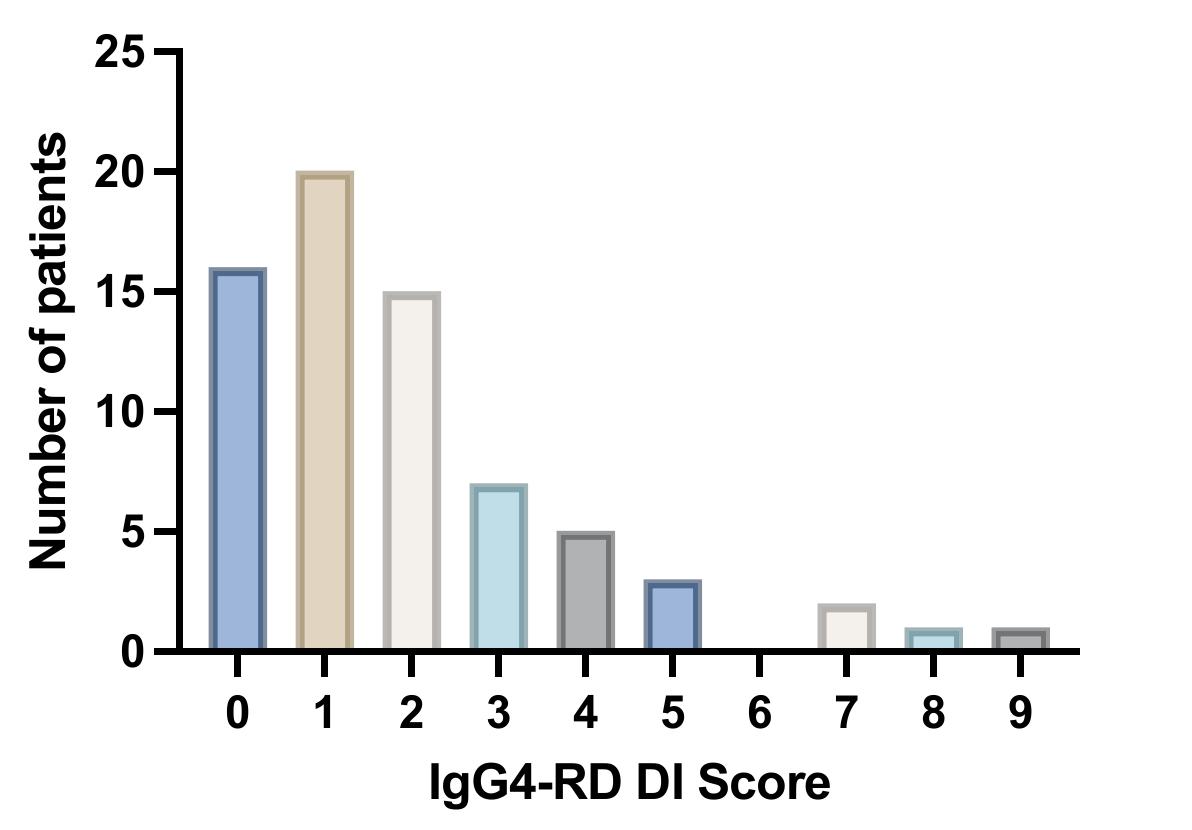Session Information
Date: Monday, October 27, 2025
Title: (1147–1190) Miscellaneous Rheumatic & Inflammatory Diseases Poster II
Session Type: Poster Session B
Session Time: 10:30AM-12:30PM
Background/Purpose: IgG4-related disease (IgG4-RD) is a chronic fibroinflammatory disorder affecting multiple organs, often leading to irreversible damage. Standardized tools like the IgG4-RD Damage Index (DI) are crucial for understanding disease progression and phenotype-specific characteristics, but their performance remains untested in non-Chinese populations. This study aimed to assess damage in Mexican IgG4-RD patients using the IgG4-RD DI.
Methods: We conducted a retrospective study of patients with IgG4-RD who met the 2020 Revised Comprehensive Diagnostic Criteria and/or the 2019 ACR/EULAR Classification Criteria for IgG4-RD. All patients were followed for at least one year. Damage was defined as irreversible organ dysfunction or failure caused by IgG4-RD or by procedures performed for its diagnosis or treatment and persisted for at least six months. Damage was assessed using the IgG4-RD DI at the last follow-up.
Results: We included 70 patients with a mean age of 52.1 ± 15.6 years, of whom 34 (48.6%) were male. The median duration of disease (from symptom onset to last follow-up) was 77.5 months (IQR 54–133). At the last follow-up, organ damage was detected in 56 patients (80%) based on the IgG4-RD RI. The median DI score for the entire cohort was 1 (IQR 0–3), while for patients with damage it was 2 (IQR 1–3; range 1–9). Figure 1 shows the distribution of IgG4-RD DI scores. The most frequently affected organ-specific domains of the IgG4-RD DI were ‘Pancreas’ (31.4%), ‘Lung’ (15.7%), ‘Kidney’ (11.4%), ‘Retroperitoneum/mediastinum’ (8.6%), and ‘Liver/biliary tree’ (8.6%). The ‘Others’ domain was scored in 26 patients (37.1%), primarily due to partial or total organ resection related to IgG4-RD (22.8%), disease-related or treatment-related diabetes mellitus (15.7%), and damage in other organs (14.3%). Patients with the head and neck-limited phenotype had lower DI scores (p=0.05). The ‘Retroperitoneum/mediastinum’ domain was scored more frequently in the retroperitoneal/aortic phenotype (p< 0.001), while the ‘Pancreas’ domain was scored more frequently in the pancreato-biliary and Mikulicz/systemic phenotypes (p=0.001). The ‘Kidney’ domain was more commonly scored in the retroperitoneal/aortic phenotype (p=0.01), due to obstructive nephropathy. The proliferative phenotype had more commonly damage in the ‘Pancreas’ domain (p=0.01), while the fibrotic phenotype in the ‘Retroperitoneum/mediastinum’ (p< 0.001) and ‘Thyroid’ domains (p=0.02). There were no significant differences in DI scores or domain involvement between men and women.Comparing patients with and without damage (Table 1), the former group was less likely to have the head and neck-limited phenotype (20.4% vs. 56.3%, p=0.005; OR: 0.16), and more likely to have elevated IgG levels (60.9% vs. 31.3%, p=0.04; OR: 4.67).
Conclusion: Organ damage is frequent in IgG4-RD, varies by phenotype, and is most common in the pancreas. Elevated IgG levels increase damage risk, while the head and neck-limited phenotype is protective. Organ resections for diagnostic or therapeutic purposes and glucocorticoid toxicity are key contributors to cumulative damage in IgG4-RD.
 Figure 1. Distribution of the IgG4-RD DI scores
Figure 1. Distribution of the IgG4-RD DI scores
.jpg) Table 1. Characteristics of patients with damage vs. no damage.
Table 1. Characteristics of patients with damage vs. no damage.
To cite this abstract in AMA style:
Martin-Nares E, Hernandez-Molina G. Assessment Of Damage Using The IgG4-Related Disease Damage Index. [abstract]. Arthritis Rheumatol. 2025; 77 (suppl 9). https://acrabstracts.org/abstract/assessment-of-damage-using-the-igg4-related-disease-damage-index/. Accessed .« Back to ACR Convergence 2025
ACR Meeting Abstracts - https://acrabstracts.org/abstract/assessment-of-damage-using-the-igg4-related-disease-damage-index/
